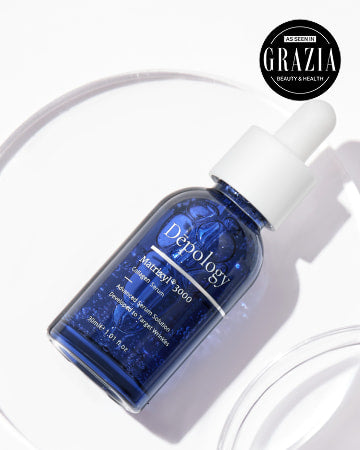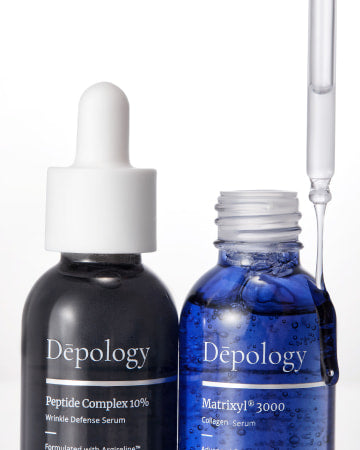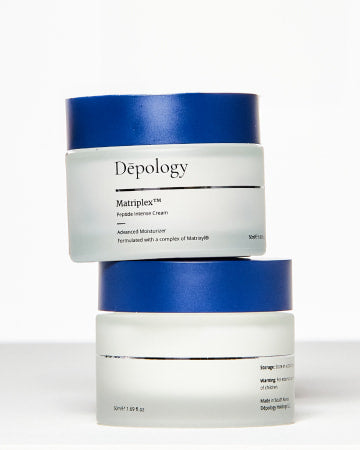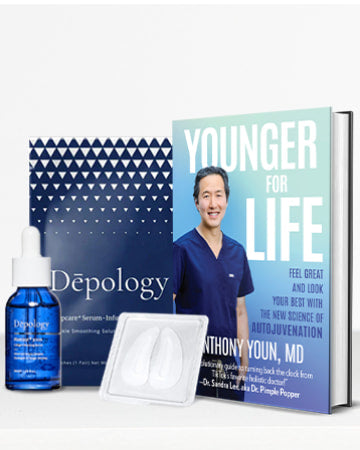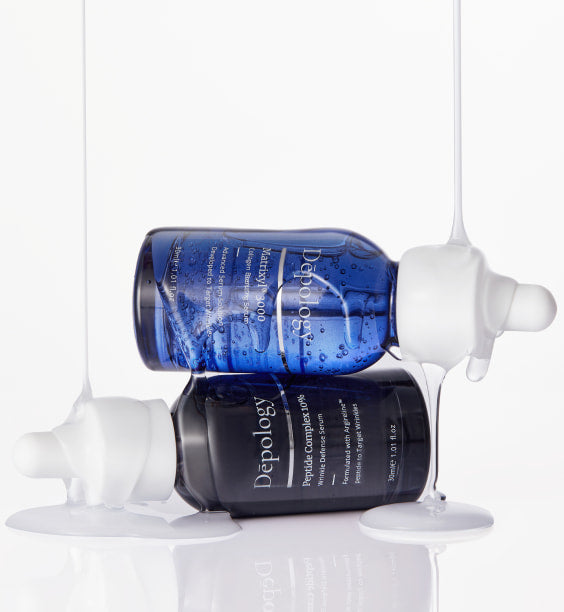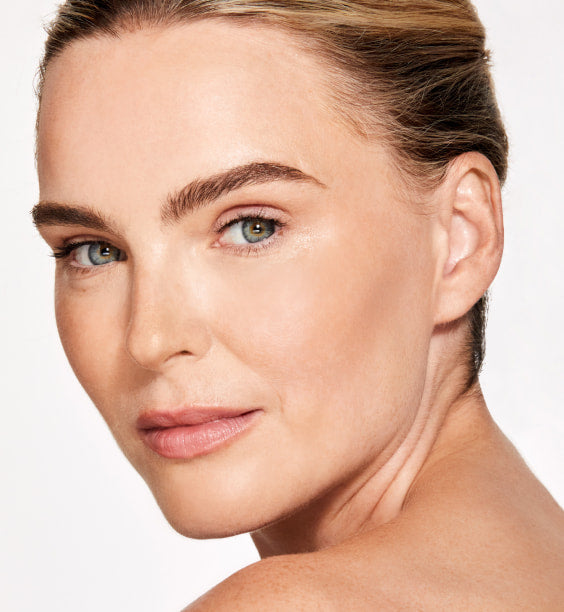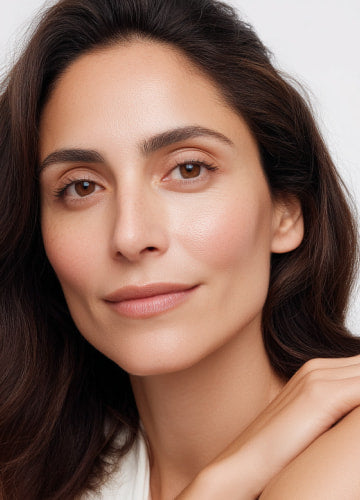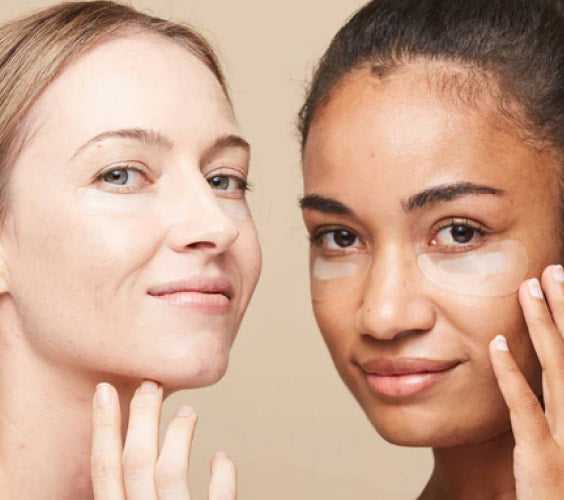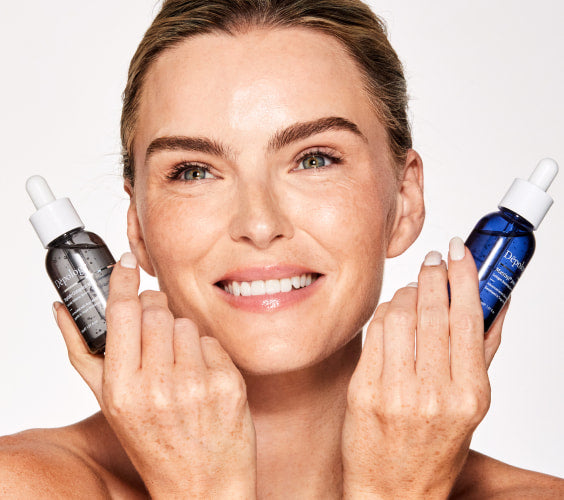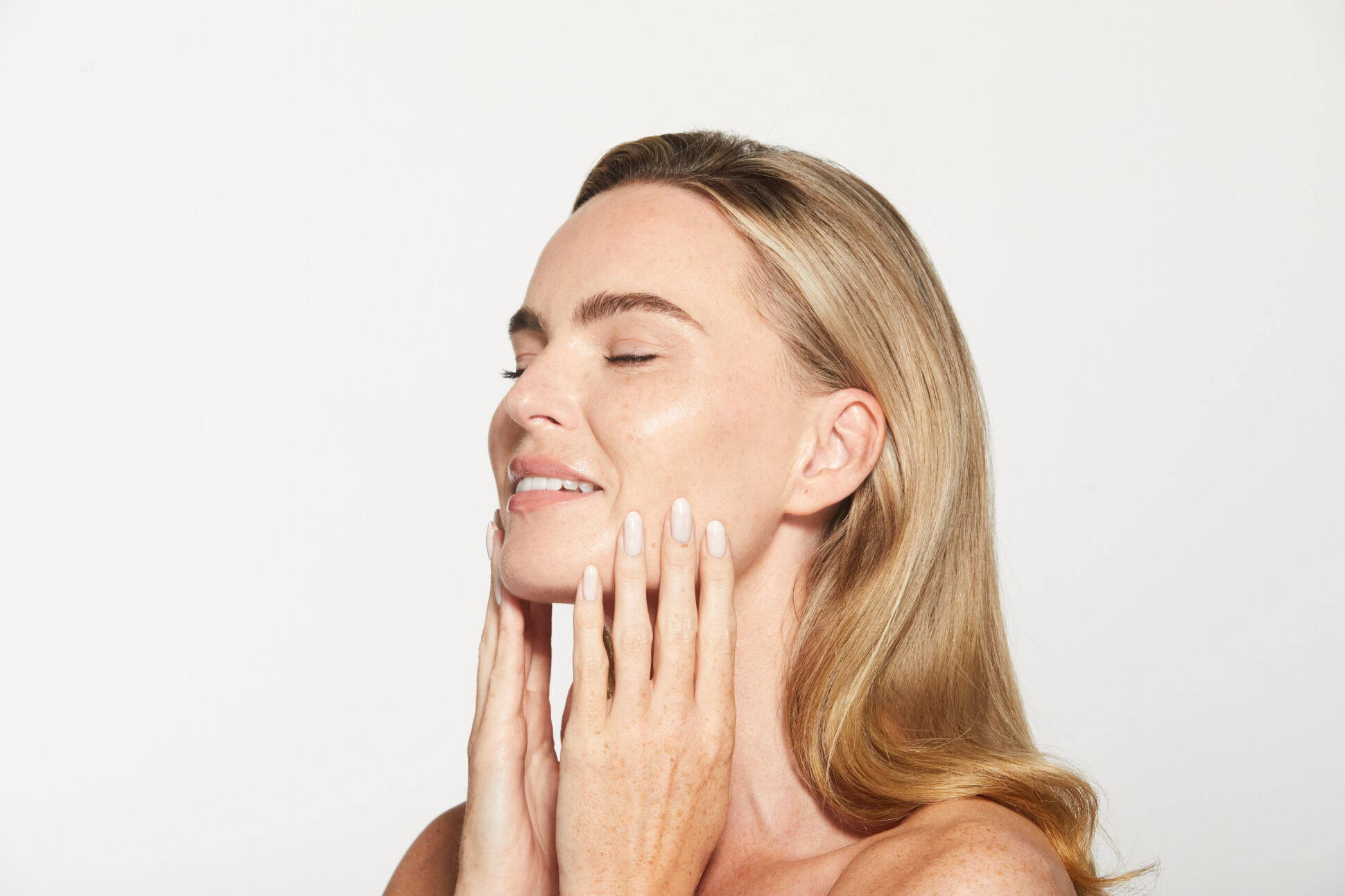
What Are The Best Skincare Serums For Oily Skin?
Oily skin, often characterized by excess sebum production, enlarged pores, and occasional breakouts, typically requires targeted care to balance texture and address common skin concerns. Serums formulated specifically for oily skin offer a potent and lightweight solution. These specialized elixirs are designed to provide essential nutrients, control oil production, and combat issues like acne while leaving your skin revitalized.
Our team at Dēpology explores below the most efficient ingredients and serums tailored to the needs of oily skin, ensuring you achieve a clear, balanced complexion and minimize the appearance of pores for a confident, shine-free glow.
What type of serum is best for oily skin?
If you have oily skin, you'll want to choose a serum that helps control excess oil production, minimize pores, and maintain a balanced complexion. Look for serums with the following ingredients and characteristics:
Hyaluronic Acid: Even though you have oily skin, it's important to keep it well-hydrated. Hyaluronic acid is a lightweight, non-comedogenic ingredient that provides hydration without making your skin greasy.
CTA: Deepcare+ Serum-infused Micro Dart Patches
Niacinamide (Vitamin B3): Niacinamide helps regulate oil production, reduces inflammation, and can minimize the appearance of pores.
CTA: Dark Spot Correcting N.A.T. Serum
Salicylic Acid: This beta hydroxy acid (BHA) is oil-soluble and can penetrate the pores, helping to unclog them and reduce acne. It also contains anti-inflammatory properties.
Glycolic Acid: An alpha hydroxy acid (AHA) like glycolic acid can help exfoliate the skin, remove dead skin cells, and improve skin texture. This can be beneficial for oily skin but should be used in moderation.
CTA: Gentle Exfoliating Glycolic Acid Facial Cleanser
Tea Tree Oil: Tea tree oil has natural antibacterial and anti-inflammatory properties, making it a good option for acne-prone, oily skin. However, it should be diluted before applying to the skin.
Matte Finish Serums: Look for serums that have a matte finish. These are designed to control excess shine and oil throughout the day.
Oil-Free Formulas: Ensure that the serum you choose is labeled as "oil-free" or "non-comedogenic" to avoid clogging your pores.
Lightweight and Gel-Based: Serums with lightweight, gel-based textures are often better suited for oily skin as they are less likely to feel heavy or greasy.
SPF: If your serum contains sun protection, that's even better. Sunscreen is crucial for all skin types, including oily skin, to protect it from UV damage.
What are the best serums for acne-prone skin?
The best serums on the market for acne-prone skin should focus on ingredients that can help treat and prevent acne, reduce inflammation, and promote overall skin health. Here are some key ingredients and types of serums that are often recommended for acne-prone skin:
Salicylic Acid Serum: Salicylic acid is a beta hydroxy acid (BHA) that penetrates the pores to exfoliate and unclog them. It helps to reduce acne breakouts, blackheads, and whiteheads. Look for a serum with a concentration of 0.5% to 2% salicylic acid.
Niacinamide Serum: Niacinamide, also known as vitamin B3, has anti-inflammatory properties and helps regulate sebum production. It can reduce redness and improve the overall texture of the skin.
CTA: Pro-Firming Matrixyl® 3000 + Dynalift™ Night Mask
Hyaluronic Acid Serum: Even acne-prone skin needs hydration. Hyaluronic acid is a lightweight, non-comedogenic ingredient that provides moisture without clogging pores.
Tea Tree Oil Serum: Tea tree oil has natural antibacterial and anti-inflammatory properties. It can help to target acne-causing bacteria and reduce inflammation. However, it should be diluted before application.
Retinol Serum: Retinol, a form of vitamin A, can help with cell turnover and unclogging pores. It's effective at treating acne but can be irritating, so it's best to start with a lower concentration and use it sparingly.
CTA: Anti-Aging Retinol Night Cream
Vitamin C Serum: Vitamin C is an antioxidant that can help fade post-acne marks and improve overall skin tone. It's also beneficial for its anti-aging properties.
CTA: Power C Antioxidant Radiance Boosting Serum
Glycolic Acid Serum: Glycolic acid is an alpha hydroxy acid (AHA) that can exfoliate the skin, reduce the appearance of acne scars, and improve skin texture.
Oil-Free and Non-Comedogenic Formulas: Make sure the serum you choose is labeled as oil-free and non-comedogenic to prevent clogged pores, which can cause further breakouts and inflammation.
Serums with Calming Ingredients: Look for serums that contain calming ingredients like aloe vera, chamomile, or green tea extract to reduce redness and irritation associated with acne.
CTA: Cica H.A. Calm & Repair Serum
Serums with SPF: Sun protection is crucial, especially when using active ingredients like salicylic acid or retinol, as they can make your skin more sensitive to UV damage.
When incorporating a new serum into your skincare routine, it's best to introduce it gradually and observe how your skin reacts. It's also a good idea to consult with a dermatologist or skincare professional for personalized recommendations, especially if you have severe or persistent acne.
Are there skincare serums that can help with reducing pores?
If you're looking to minimize the appearance of pores and improve the overall texture of your skin, there are several serums available. Here are some serums and ingredients that are known for their pore-minimizing properties:
Niacinamide Serum: Niacinamide, also known as vitamin B3, is a versatile ingredient that helps regulate sebum production, reduces inflammation, and tightens enlarged pores. It can improve the overall appearance of your skin and is suitable for most skin types.
Salicylic Acid Serum: Salicylic acid is a beta hydroxy acid (BHA) that can penetrate the pores and exfoliate the inside of the pore walls. This helps to unclog pores and reduce their size. It's especially effective for those with oily and acne-prone skin.
Glycolic Acid Serum: Glycolic acid is an alpha hydroxy acid (AHA) that exfoliates the surface of the skin, removing dead skin cells and helping to refine the appearance of pores. It can also improve skin texture.
Retinol Serum: Retinol, a form of vitamin A, can stimulate collagen production and improve skin elasticity. This can lead to firmer skin, which can make pores appear smaller.
Hyaluronic Acid Serum: While not directly reducing pore size, hyaluronic acid helps hydrate the skin, plump it up, and create a smoother surface. This can make pores appear less noticeable.
Vitamin C Serum: Vitamin C is an antioxidant that can brighten the skin and improve its overall texture. It won't directly reduce pore size, but by improving skin quality, pores may appear less prominent.
Peptide Serums: Peptides can help with collagen production, which can improve skin elasticity and firmness, making pores appear smaller.
CTA: Peptide Complex 10% Argireline™ Peptide Serum
Pore-Refining Serums: Some serums are specifically formulated to target pore size and skin texture. Look for serums labeled as "pore-refining" or "pore-minimizing" for these purposes.
When using these serums, be sure to follow the product instructions carefully and start with a lower concentration if you have sensitive skin. Additionally, incorporating a healthy skincare routine that includes cleansing, moisturizing, and sun protection is important for maintaining healthy skin and minimizing the appearance of pores.
Can serums help with skin brightening?
Yes, serums can absolutely be effective in helping to brighten the skin. Skin brightening serums typically contain specific ingredients that target hyperpigmentation, uneven skin tone, and dullness. Here are some key ingredients commonly found in skin-brightening serums:
Vitamin C: Vitamin C is a potent antioxidant that helps to reduce the appearance of dark spots and uneven skin tone. It also boosts collagen production, which can give your skin a brighter and more youthful appearance.
Niacinamide (Vitamin B3): Niacinamide is known to reduce the production of melanin, which is responsible for dark spots and uneven skin tone. It can also improve skin texture and reduce redness.
Alpha Hydroxy Acids (AHAs): AHAs like glycolic acid and lactic acid help exfoliate the top layer of the skin, which can reduce the appearance of dullness and uneven skin tone. They can also improve the absorption of other brightening ingredients.
Kojic Acid: Kojic acid is derived from mushrooms and is known for its skin-brightening properties. It can help fade dark spots and even out skin tone.
Licorice Root Extract: Licorice root extract contains compounds that can help reduce hyperpigmentation and soothe the skin. It's often used in brightening serums.
CTA: Cica Redness Relief Nourishing Cleanser
Arbutin: Arbutin is a natural skin brightener that works by inhibiting the production of melanin. It can help fade dark spots and create a more even complexion.
Hyaluronic Acid: While not a direct skin brightener, hyaluronic acid helps retain moisture in the skin, giving it a plump and radiant appearance.
Retinol: Retinol can promote skin cell turnover and exfoliation, which can lead to a brighter complexion over time.
When using a skin-brightening serum, it's essential to be consistent and patient, as results may take several weeks to become noticeable. Here are some tips for using skin-brightening serums effectively:
Apply in the Evening: Many brightening ingredients can make your skin more sensitive to the sun, so it's often best to apply these serums in the evening.
Use Sunscreen: Always use sunscreen during the day to protect your skin from further UV damage and to prevent dark spots from worsening.
Patch Test: Before applying a new product to your entire face, do a patch test to ensure you don't have any adverse reactions.
Follow Instructions: Follow the product instructions carefully regarding application frequency and the amount to use.
Consult a Professional: If you have stubborn pigmentation issues or concerns about your skin, consider consulting a dermatologist for personalized advice and potentially more advanced treatments.
What are recommended skincare routines for oily skin?
A good skincare routine for oily skin should control excess oil production, prevent breakouts, and maintain a balanced and healthy complexion. Here's a step-by-step guide for the best skincare routine for oily skin:
AM Skincare Routine for Oily Skin:
Cleanser: Start your morning routine with a gentle, foaming, or gel-based cleanser that is specifically formulated for oily or acne-prone skin. This helps remove any excess oil and impurities that have accumulated overnight.
Toner: Apply an alcohol-free, oil-free toner to help balance the skin's pH and reduce the appearance of pores. Look for ingredients like witch hazel or salicylic acid to help control oil.
CTA: Daily Glow Exfoliant Boosting Toner
Serum (Optional): If you have specific concerns like acne or uneven skin tone, apply a targeted serum. For oily skin, a serum with niacinamide or vitamin C can be beneficial.
Moisturizer: Use an oil-free, lightweight, and non-comedogenic moisturizer. Even oily skin needs hydration to maintain a healthy barrier. Gel-based moisturizers can work well for oily skin.
CTA: Tri-Active Matrixyl® Complex Cream
Sunscreen: Finish your morning routine with a broad-spectrum SPF 30 or higher sunscreen. Look for a sunscreen that's oil-free and non-comedogenic. Sunscreen is crucial for protecting your skin from UV damage and preventing premature aging.
PM Skincare Routine for Oily Skin:
Makeup Remover/Cleansing Oil (If Wearing Makeup): If you wear makeup, start with a makeup remover or cleansing oil to thoroughly remove makeup and sunscreen.
Cleanser: Follow up with the same gentle cleanser you used in the morning to cleanse your face.
Exfoliation (2-3 Times a Week): Exfoliating helps remove dead skin cells and unclog pores. Use a gentle chemical exfoliant with salicylic acid or glycolic acid. Start with 2-3 times a week and adjust based on your skin's tolerance.
Toner: Apply toner to balance the skin's pH and prepare it for the next steps.
Serum: Use a serum with active ingredients such as niacinamide, retinol, or hyaluronic acid, depending on your specific skin concerns. Apply it after toning and before moisturizing.
Moisturizer: Apply a lightweight, oil-free moisturizer to keep your skin hydrated without clogging pores.
Spot Treatment (As Needed): If you have active breakouts, use a targeted spot treatment with ingredients like benzoyl peroxide or salicylic acid.
Weekly Skincare Routine (1-2 Times a Week):
Clay Mask: Use a clay mask once or twice a week to help absorb excess oil and tighten pores.
Exfoliation (1-2 Times a Week): In addition to your regular exfoliation routine, consider using a more intensive exfoliating mask containing alpha hydroxy acids (AHAs) or beta hydroxy acids (BHAs) once or twice a week.
Additional Tips:
- Avoid over-cleansing, as this can strip your skin of natural oils and lead to increased oil production.
- Use lukewarm water for cleansing to avoid over-drying your skin.
- Avoid heavy, greasy products.
- Blotting papers can be used throughout the day to control excess oil.
- Be consistent with your skincare routine, and give products time to work before expecting results.
CTA: Dēpology Serums - Full Collection
Conclusion
Embracing a tailored skincare routine for oily skin with the right serums can be life-changing in your quest for a healthier, more luminous complexion. By incorporating these specialized formulas into your daily regimen, your skin will become empowered with the essential ingredients it craves, from oil control to anti-aging properties. Never forget the importance of patience, self-care, and the joy of feeling confident in your skin.

